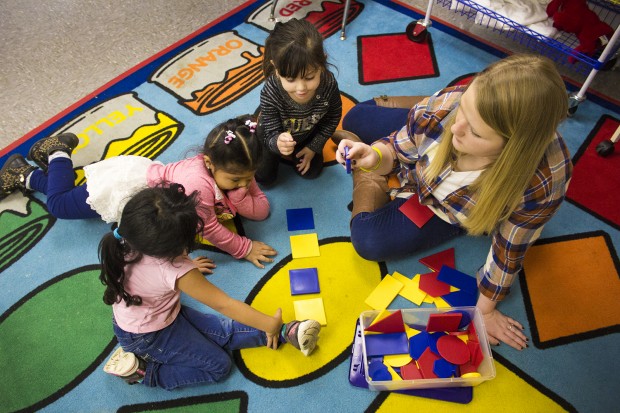Report: Work Requirement Makes Indiana Lag Behind In Pre-K Access

According to state law, to be eligible for state-funded pre-K, a parent needs to be working or attending school within 30 days of the program’s start. (Peter Balonon-Rosen/Indiana Public Broadcasting)
Indiana lags far behind other states in providing families access to state-funded pre-K programs, according to a new study of Indiana’s pre-K offerings. The analysis finds Indiana, the only state that ties a family’s pre-K eligibility to work and education requirements, limits participation for children who may be most in need.
The report from Early Learning Indiana, a preschool advocacy organization, says the requirement ends up “penalizing” children whose parents may not be able to work due to struggles with “addiction, mental health issues, housing instability, domestic violence and chronic illness.”
“To put barriers on families that are already struggling for someone that is really an equalizer – education is an equalizer – that requirement really limits access and participation,” says Karen Ruprecht, director of research and practice at Early Learning Indiana.
To be eligible for Indiana’s state-funded pre-K, a parent needs to be working or attending school within 30 days of the program’s start. It’s remained a controversial provision in the state’s pre-K expansion plan.
“Legislators decided to make that a requirement for pre-K, but no other state in the country does that,” Ruprecht says. “And there’s some really good reasons.”
Early Learning Indiana was one of the lead organizations advocating for statewide pre-K at the Statehouse this year.
Currently, 44 states offer some type of state-funded pre-K system. In 2016, Indiana’s program served just 1.9 percent of all eligible 4-year-olds, or 1,585 children. The report ranks Indiana 43rd of those 44 states in providing access to programs.
Indiana has taken steps forward to increase both state-funding and access to state-funded pre-K. In April, Gov. Eric Holcomb signed a bill into law that would expand Indiana’s pre-K options.
Under the new $22 million plan, 15 counties could offer state-funded pre-K to qualifying families. Any of the state’s 92 counties are eligible. Lawmakers say they will prioritize rural counties and areas that lack high-quality pre-K.
Ruprecht says these are great first steps. She hopes to see expansion continue to families across the state regardless of zip code.
“We can’t stop access at the county line,” Ruprecht says. “We don’t do that for roads and we shouldn’t do that for early care and education.”
On top of income and geography limits, the state also provides the limited pre-K seats to within a certain income limit. Families can access the program if they make no more than 127 percent of the poverty threshold, about $38,000 annual income for a family of four.
Eleven of the 44 states that offer state-funded pre-K programs have universal access, meaning the only requirement for participation is having an age-eligible child.